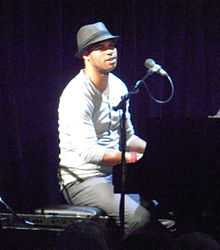Roberto Fonseca
| Roberto Fonseca | |
|---|---|
 Roberto Fonseca | |
| Background information | |
| Origin | Havana, Cuba |
| Genres | Jazz, Hip-Hop, latin jazz, drum and bass, urban music, Afro-Cuban music |
| Years active | 1999 – present |
Roberto Fonseca (born 1975, Havana) is a Cuban jazz pianist. From an early age, Fonseca was surrounded by music: his father was a drummer, his mother, Mercedes Cortes Alfaro, a professional singer (she sings on her son's most recent solo album, Zamazu), and his two older half-brothers, Emilio Valdés (drums) and Jesús "Chuchito" Valdés Jr. (piano) are also two young musicians of great international prestige.
After an early interest in drums, Fonseca switched to piano at the age of 8, and by 14 was experimenting with fusing American jazz and traditional Cuban rhythms; he appeared at Havana's Jazz Plaza Festival in 1991 when he was just 15.
Fonseca studied at the Cuba's prestigious Instituto Superior de Arte, where he obtained a master's degree in composition, even though he often says that he was a really bad student. After earning his degree, he left Cuba to find his sound.
His first album, En El Comienzo, which he recorded with Javier Zalba and the group Temperamento, was awarded Cuba's Best Jazz Album in 1999. This success encouraged him to work on two solo records: Tiene Que Ver and Elengo, combining latin jazz, drum and bass, hip-hop, urban music and Afro-Cuban rhythms.
In 2001, Fonseca went to Japan to record No Limit: Afro Cuban Jazz. He also toured with the Buena Vista Social Club the same year and has worked with Rubén González, Ibrahim Ferrer, Cachaito, Guajiro Mirabal and Manuel Galbán.
A dream that toured all over the world, with over 400 concerts, promoting Ibrahim Ferrer's records next to great legends such as Cachaíto López, Manuel Guajiro Mirabal and Manuel Galbán, among others. Playing at the most prestigious venues, such as Frankfurt Alter Oper, Palais des Congrès (Paris), Albert Hall (London), Beacon Theatre (New York), Sydney Opera House (Australia), etc. Not a single review of Ibrahim's concerts, from South America to Asia, would fail to mention Fonseca's talent and his magnetic stage presence.
That period of intense work, touring round the world, led Fonseca to realise that his music was ready for creating his own project. He dug deep to compose each of the songs that form Zamazu, the result of the integration of all his influences; Afro-Cuban music, Jazz, classical music and traditional Cuban music.
In the words of one reviewer,[1] his last offering, Zamazu, is “a deftly varied and well-sequenced set that leaves a strong impression of who Fonseca is and promises plenty for the future".
2008 was a year full of work and experiences that have inspired Fonseca's new compositions, one being Columbia Pictures choosing the track "Llego Cachaito" from the Zamazu album for the Will Smith film "Hancock”.
With his latest album Akokan Fonseca wanted to bring the magic, strength and improvisation from a live show to the studio. With a quartet formation and accompanied by his band, the one that he has been playing with for the last 12 years, Fonseca as the record's producer has encouraged creativity and chemistry amongst the musicians
There are also two very special collaborations from artists that Fonseca admires, artists that have very different styles: Mayra Andrade, the Cape Verdean singer who wrote the words and sings on "Siete potencias", and Raul Midon, the American guitarist, wrote "Second Chance". On this track Fonseca did the arrangements and Midon accompanied him on guitar. In comparison to Zamazu, on this new album the piano is the true protagonist with some incredible piano solos and a different way of playing, one enriched by many experiences and the desire for us to feel his passion for life and music as the driving force of each piece.
2010 Roberto Fonseca was the support act for Omara Portuondo's USA. And after the summer her latest album Roberto Fonseca Live in Marciac was released. this album includes a bonus DVD which features footage of Festival's 2009 show.
Discography
Albums
- 1999: Tiene Que Ver
- 1999: Temperamento: En el Comienzo
- 2001: No Limit
- 2001: Elengo
- 2007: Zamazu
- 2009: Akokan
- 2010: Live in Marciac
- 2012: Yo
Collaborations
- Black P. Marabal Soundtrack (2000)
- Cuando Yo Sea Grande – Augusto Enriquez – 1998 (Egrem)
- Cachaíto – Orlando "Cachaito" López – 2001 (World Circuit Records)
- Felicidad – Asa Feeston – 2002 Inter Records Co Ltd
- Buenos Hermanos – Ibrahim Ferrer – 2003 (World Circuit Records)
- Buena Vista Social Club Presents Manuel Guajiro Mirabal – Manuel Guajiro Mirabal – 2004 (World Circuit Records)
- Flor de Amor – Omara Portuondo – 2004 (World Circuit Records)
- Angá Echumingua – Anga Díaz – 2005 (World Circuit Records)
- Javier Zalba – Javier Zalba – 2006 (Colibri)
- Timbalada – Carlinhos Brown – 2006 (Candyall Music)
- Mi sueño - Ibrahim Ferrer – 2007 (World Circuit Records)
- Absolument Latino song Zamazamazu - 2007
- Gracias – Omara Portuondo – 2008 (Montuno / Harmonia Mundi)
- Omara & Maria Bethânia – 2008 (Biscoito Fino)
- Etxea – Kepa Junkera – 2008 (Warner Music Spain)
- Gilles Peterson presents Havana Cultura New Cuban Sound – 2009 (Brownswood Recordings)
- Gilles Peterson presents Havana Cultura Remixed – 2010 (Brownswood Recordings)
References
- ↑ "Roberto fonseca – Zamazu review". BBC World Music. Retrieved 2008-07-02.
External links
- Official Website
- Myspace
- Official Facebook Page
- Management of Roberto Fonseca (containing tourdates)
- Video interview of Roberto Fonseca on Havana-Cultura
- Festival International de Jazz de Montréal – ROBERTO FONSECA
|